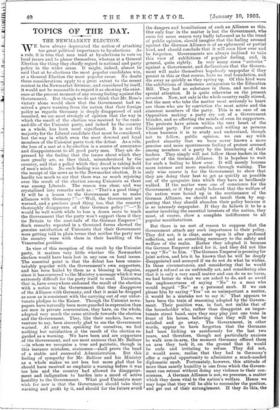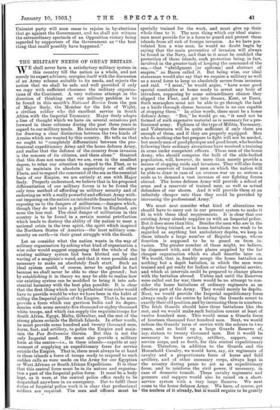TOPICS OF THE DAY.
THE NEWMARKET ELECTION.
WE have always deprecated the notion of attaching too great political importance to by-elections. As a rule, it is true that men tend at by-elections to vote on local issues and to please themselves, whereas at a General Election the thing they chiefly regard is national and party policy in the wider sense. It might, indeed, almost be said that at by-elections the most popular candidates win, at a General Election the most popular cause. No doubt these considerations apply to a great extent to the recent contest in the Newmarket division; and considered by itself, it would not be reasonable to regard it as showing the exist- ence at the present moment of any strong feeling against the Government. But though we do not think that Mr. Rose's victory alone would show that the Government had re- ceived a grave warning from the nation that their foreign policy as regards Germany is deeply disapproved of and resented, we are most strongly of opinion that the way in which the result of the election was received by the rank- and-file of the Unionist party, and indeed by the country as a whole, has been most significant. It is not the majority for the Liberal candidate that must be considered, but the way in which even the most devoted and loyal members of the Unionist party took the defeat. As a rule, the loss of a seat at a by-election is a source of annoyance and disappointment to all aood party men. They are de- pressed by the feeling that the issues about which they care greatly are, as they think, misunderstood by the country, and that a policy which they dread is taking hold of men's minds. No such feeling was anywhere visible on the receipt of the news as to the Newmarket election. It is hardly too much to say that there was as much rejoicing over the result of the election among Unionists as there was among Liberals. The reason was clear, and was crystallised into remarks such as : " That's a good thing ! It will be a lesson to the Government not to make alliances with Germany ! "—" Well, the Government are warned, and a precious good thing too, that the country thoroughly disapproves of their German policy ! "—" It would be well worth while to lose a dozen seats to teach the Government that the party won't support them if they tie Britain to the coat-tails of the German Emperor ! " Such remarks repeated in a thousand forms showed the genuine satisfaction of Unionists that their Government were getting told in plain terms that neither the party nor the country were with them in their handling of the Venezuelan problem.
In view of this reception of the result by the Unionist party, it matters very little whether the Newmarket election would have been lost in any case on local issues. The essential point is that the defeat has been unmis- takably popular with the Government's own supporters, and has been bailed. by them as a blessing in disguise, since it has conveyed to the Ministry a message which it was extremely difficult for the party itself to send. Unionists, that is, have everywhere endorsed the result of the election with a notice to the Government that they disapprove of the Alliance with Germany, and that it must be dropped as soon as is consistent with the carrying out of our unfor- tunate pledges to the Kaiser. Though the Unionist news- papers have naturally been more guarded in expression than are men in private conversation, they have, on the whole, adopted very much the same attitude towards the election and the Government. They, like their readers, have, we venture to say, been sincerely glad to see the Government warned. At any rate, speaking for ourselves, we feel nothing but satisfaction at the result of the election re- garded as a warning. We have been and are supporters of the Government, and are most anxious that Mr. Balfour —in whom we recognise a true and patriotic, though in this instance mistaken, statesman—shall prove the head of a stable and successful Administration. But this feeling of sympathy for Mr. Balfour and his Ministry as a whole makes us not less but more glad that he should have received so emphatic a warning before it was too late and the country had allowed its disappoint- ment and indignation to harden into a mood of active hostility to the Government. What good Unionists must wish for now is that the Government should take their warning and profit by it, and should for the future avoid the dangers and humiliations of such an Alliance as this. Our only fear in the matter is lest the Government, who seem for some reason very badly informed as to the trend of public opinion, should imagine that the feeling aroused against the German Alliance is of an ephemeral or partial kind, and should conclude that it will soon blow over and be forgotten. Governments are always inclined to take this view of exhibitions of popular feeling, and, in general, quite rightly. In very many cases " outcries " against a Government, and declarations that the Govern- ment will make themselves hopelessly unpopular if they persist in this or that course, have no real foundation, and die away as quickly as they spring up. Of this kind were the exhibitions of clamorous antagonism to the Education Bill. They had no substance in them, and needed no special attention. It is quite otherwise on the present occasion. Now, not only is the whole country really stirred, but the men who take the matter most seriously to heart are those who are by conviction the most active and the sincerest members of the party. This is no case of an Opposition making a party cry out of a Government blunder, and so affecting the minds of even its supporters. The protests have arisen within the very heart of the Unionist party. For ourselves, and writing as persons whose business it is to study and understand, though not to follow, public opinion, we can say with perfect sincerity that we have never known a more genuine and more spontaneous feeling of protest aroused among members of a party by the blundering of their leaders. They simply will not follow those leaders in the matter of the German Alliance. It is hopeless to wait for such a feeling to blow over. It will merely become more intense and more resolute through waiting. The only wise course is for the Government to show that they are doing their best to get as quickly as possible out of the quagmire into which they have so heedlessly walked. If the matter were one of conscience for the Government, or if they really believed that the welfare of the nation were bound up in the continuance of the German Alliance, we should not insult them by sug- gesting that they should abandon their policy because it is so intensely unpopular. If they do believe it to be a matter involving the essential interests of the nation, they must, of course, show a complete indifference to all popular manifestations.
But there is no sort of reason to suppose that the Government attach any such importance to their policy. They did not, it is clear, enter upon it after profound reflection, and as something necessary to the safety and welfare of the realm. Rather they adopted it because the German Emperor asked for it, and they did not like to say "No" to him. ' The German Emperor is pressing for joint action, and lets it be known that he will be deeply disappointed and annoyed if we do not do what he wishes. In these circumstances, and considering that he would regard a refusal as an unfriendly act, and considering also that it is only a very small matter and can do us no harm, we had better do what we are asked to do, and so avoid the unpleasantness of saying "No" to a man who would regard "No" as a personal snub. If we can please him by saying "Yes" on so unimportant a matter, it would be a mistake not to say it.' That appears to have been the train of reasoning adopted by the Govern- ment. Their position was, in fact, not unlike that of the householder who, rather than disappoint an impor- tunate street band, says they may play just one tune in front of his house, believing that they will then be satisfied and go away. The Government, in other words, appear to have forgotten that the Germans had been kicking us assiduously for the last two years, and therefore, though not particularly anxious to walk arm-in-arm, the moment Germany offered them an arm they took it, on the ground that it would be rude and irritating to refuse. They did not, it would seem, realise that they had in Germany's offer a capital opportunity to administer a much-needed diplomatic snub. Fortunately, however, this attitude of more than saintly humility is one from which the Govern- ment can retreat without doing any violence to their con- sciences. A German Alliance is not, we presume, a matter which they deem vital to the nation's welfare. Hence we may hope that they will be able to reconsider the position, and get out of their entanglement. If they do this, the Unionist party will soon cease to rejoice in by-elections that go against the Government, and we shall not witness the extraordinary spectacle of an Opposition victory being regarded by supporters of the Government as " the best thing that could possibly have happened."







































 Previous page
Previous page